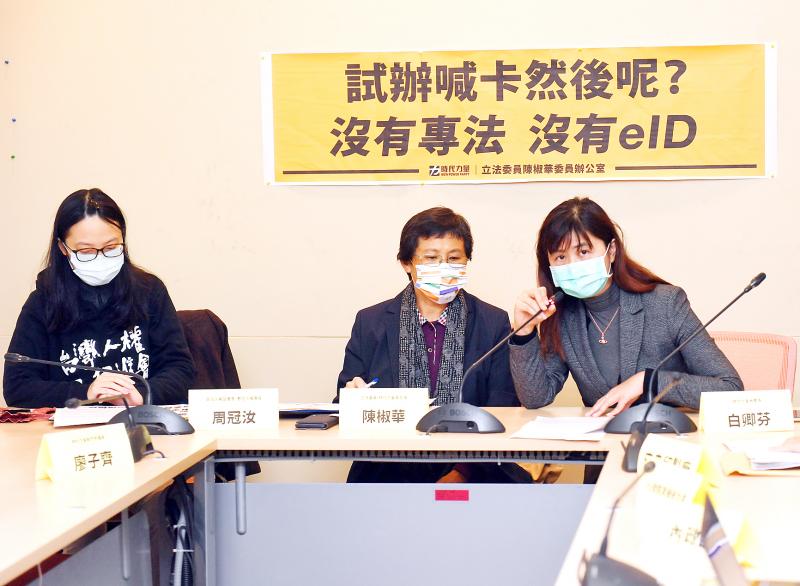The government should hold a public hearing on the issuance of electronic identification cards (eIDs) and stipulate a specific law to regulate them before requiring people to replace their paper identification cards with them, the New Power Party (NPP) said yesterday.
The eIDs would combine the functions of an identification card with those of a Citizen Digital Certificate, the Ministry of the Interior has said.
The ministry was scheduled this month to allow residents in Hsinchu City to switch to eIDs as a trial before issuing them nationwide. However, the Hsinchu City Government halted the trial on the grounds that it needs to protect its residents’ information.

Photo: CNA
To dismiss public concerns over potential information security breaches, the ministry said that the government would only issue eIDs nationwide when it is fully prepared to handle security issues.
The mandate to switch to eIDs could be against the Constitution, New Power Party Legislator Chen Jiau-hua (陳椒華) told a media conference, adding that the policy would be executed on a weak legal basis.
Countries such as Estonia, Germany and Japan have specific laws covering the enforcement of their eID policies, but the ministry insisted on using the House Registration Act (戶籍法) as the basis for implementing such a policy, Chen said.
This shows that the ministry lacks awareness about information security and the legal implications that could arise after the policy is executed, Chen said, adding that the government should stipulate a specific law to regulate the use of data on eIDs and host a public hearing as soon as possible to compile opinions on the policy from all parties.
Discussions at the hearing should also be shared with the public, Chen added.
If the government insists on enforcing the policy, it should clearly inform the public of the risks of using eIDs, as well as ways of protecting themselves from information security breaches.
Chou Kuan-ju (周冠汝), who specializes in human rights issues in the digital age at the Taiwan Association for Human Rights, said that a specific law would prevent the government from frivolously collecting personal data using the eIDs.
An independent agency should also be established to thoroughly enforce the law, Chou said.
As people cannot choose to not switch to eIDs and have to bear the risks themselves, the ministry should re-evaluate the necessity of enforcing such a policy, respect people’s rights on how their data are used and give people the option of switching to a chipless identification card, Chou said.
Central Engraving and Printing Plant vice president Yu Jiu-sheng (喻家聲) said that its personnel and facilities received ISO-27001 and BS10012 certifications to prepare for the trial this month.
Chips that are to be implanted in the eIDs would be handled based on high standards set by the ministry, Yu said, adding that all chips delivered to the plant would be locked and data cannot be stored on them.

Alain Robert, known as the "French Spider-Man," praised Alex Honnold as exceptionally well-prepared after the US climber completed a free solo ascent of Taipei 101 yesterday. Robert said Honnold's ascent of the 508m-tall skyscraper in just more than one-and-a-half hours without using safety ropes or equipment was a remarkable achievement. "This is my life," he said in an interview conducted in French, adding that he liked the feeling of being "on the edge of danger." The 63-year-old Frenchman climbed Taipei 101 using ropes in December 2004, taking about four hours to reach the top. On a one-to-10 scale of difficulty, Robert said Taipei 101

Nipah virus infection is to be officially listed as a category 5 notifiable infectious disease in Taiwan in March, while clinical treatment guidelines are being formulated, the Centers for Disease Control (CDC) said yesterday. With Nipah infections being reported in other countries and considering its relatively high fatality rate, the centers on Jan. 16 announced that it would be listed as a notifiable infectious disease to bolster the nation’s systematic early warning system and increase public awareness, the CDC said. Bangladesh reported four fatal cases last year in separate districts, with three linked to raw date palm sap consumption, CDC Epidemic Intelligence

Two Taiwanese prosecutors were questioned by Chinese security personnel at their hotel during a trip to China’s Henan Province this month, the Mainland Affairs Council (MAC) said yesterday. The officers had personal information on the prosecutors, including “when they were assigned to their posts, their work locations and job titles,” MAC Deputy Minister and spokesman Liang Wen-chieh (梁文傑) said. On top of asking about their agencies and positions, the officers also questioned the prosecutors about the Cross-Strait Joint Crime-Fighting and Judicial Mutual Assistance Agreement, a pact that serves as the framework for Taiwan-China cooperation on combating crime and providing judicial assistance, Liang

US climber Alex Honnold left Taiwan this morning a day after completing a free-solo ascent of Taipei 101, a feat that drew cheers from onlookers and gained widespread international attention. Honnold yesterday scaled the 101-story skyscraper without a rope or safety harness. The climb — the highest urban free-solo ascent ever attempted — took just more than 90 minutes and was streamed live on Netflix. It was covered by major international news outlets including CNN, the New York Times, the Guardian and the Wall Street Journal. As Honnold prepared to leave Taiwan today, he attracted a crowd when he and his wife, Sanni,